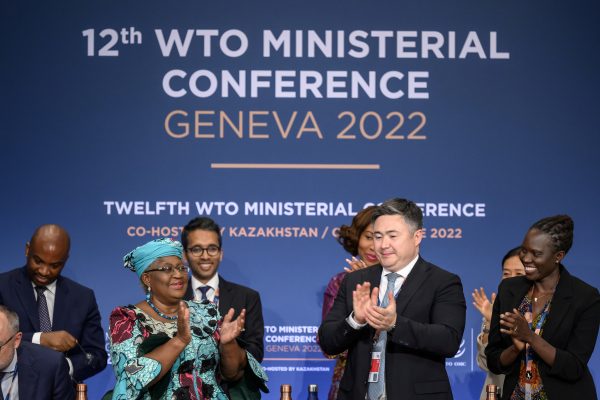The WTO’s dispute settlement system, established in 1995, adopts a two-tier system with a panel and an Appellate Body. There have been more than 600 cases dealt under this WTO regime. The WTO’s Appellate Body has been non-functional since December 2019 due to the US vetoes of the appointment of judges, with the United States claiming Appellate Body overreach.
Some WTO members resorted to ‘appeals into the void’, where losing parties at the panel stage appealed to the Appellate Body, knowing its judge-less status would necessarily halt the dispute settlement procedure. Since 2020, 18 cases have gone to appeal, eight notified by the United States.
The erosion of the foundations of the WTO dispute settlement mechanism has seen the number of new disputes decline. The annual average from 1995 to 2019 was over 20, while from 2020 to 2022, the average was only seven.
The MPIA is an appeal arbitration system created in April 2020 by 47 WTO members — including the EU, Australia, Canada and China — to keep the WTO’s dispute settlement system afloat. Currently, the membership has expanded to 53, including Japan.
If parties to a dispute are MPIA members and at least one disagrees with the panel’s findings, they use the MPIA instead of appealing to the non-functioning WTO Appellate Body. Arbitration awards are binding, and if a party does not comply, it can be subject to countermeasures. The first arbitration award was issued in December 2022. Colombia, which lost the case, expressed its intention to implement the award in a manner that respects its WTO obligations.
The United States, of course, does not participate in the MPIA, claiming that the undesirable practices of the Appellate Body were embedded in the MPIA. Having long benefited from the WTO’s appeal system, Japan initially aligned itself with the United States, deciding not to join. While experts criticised Japan’s stance, its cautious attitude was partially based on a concern that, as the MPIA became increasingly successful, WTO dispute settlement reform might lose momentum. With the United States hinting at a possible WTO exit, Japan also wanted to avoid backing them into a corner.
Why has Japan now decided to join the MPIA?
First, the prospects for successfully reforming the WTO dispute settlement system remain unclear. At the 12th WTO Ministerial Conference in June 2022, ministers agreed to achieve a ‘fully and well-functioning dispute settlement system’ by 2024. Yet the direction of Appellate Body reforms has yet to be determined, and it is uncertain whether members, including the United States, can reach a consensus. In addition, the 2024 US presidential election could further stiffen the country’s attitude toward dispute settlement reform.
Second, Japanese policymakers have faced pressure from the Japanese business sector. The panel’s findings favoured Japan in disputes over Indian and South Korean measures against Japanese steel products. These two non-MPIA member countries have appealed into the void, leaving the cases unresolved. A panel report is also expected to be issued shortly in a steel-related dispute with China. Steel industry associations have strongly urged Japan’s participation in the MPIA. And Keidanren (Japan’s Federation of Business Organisations) published a report that recommends Japan take part in the MPIA.
Japan has traditionally refrained from invoking WTO-inconsistent unilateral measures when troubled by other members’ unlawful measures. Hence, Japan could lose almost all its options if the other parties appeal into the void — neither the WTO appeal procedure nor unilateral measures would offer viable remedial options. Participation in the MPIA will help cover the gap.
Most countries would like the WTO Appellate Body to return to functionality. Meanwhile, Japan’s decision to participate in the MPIA means Japan can now aim for dispute settlement with China — Japan’s largest trading partner — as well as a significant group of other partners who participate. On 11 April 2023, both Japan and China notified the WTO they had agreed to use the MPIA’s arbitration procedure if either party disagreed with the panel’s findings.
Japan’s participation in the MPIA can also be interpreted as a strong declaration of support for the ‘rules-based international order’. As the geopolitical environment has shifted dramatically and many countries have inclined towards protectionism, Japan has reiterated its willingness to respect past commitments, and achieve a better balance between an open trading system and economic security.
Japan’s participation may also increase the incentive for other non-MPIA members to join. Since plurilateral arrangements usually have positive network externalities, the more WTO members that participate, the more the value of the MPIA increases.
Conversely, even if the MPIA expands, it is not certain whether this will be a stumbling or a building block toward WTO dispute settlement reform. It could prompt the United States to further isolate itself from the WTO, and momentum for reform might be lost. In that case, the rules-based international order could be further undermined. But it could also prompt the United States to reassess its power to press its own model of reform upon WTO members and the value of its retreat from a system that in practice continues to work.
With growing strategic competition between the United States and China and increasing protectionism, Japan aims for an active role in reforming the dispute settlement system while keeping the United States on board. Japan will have to make the best choice in its own national interests while trying not to alienate the United States.
Japan’s decision to join the MPIA demonstrates that this is possible.
Arata Kuno is Professor of International Economics at Asia University, Tokyo.

